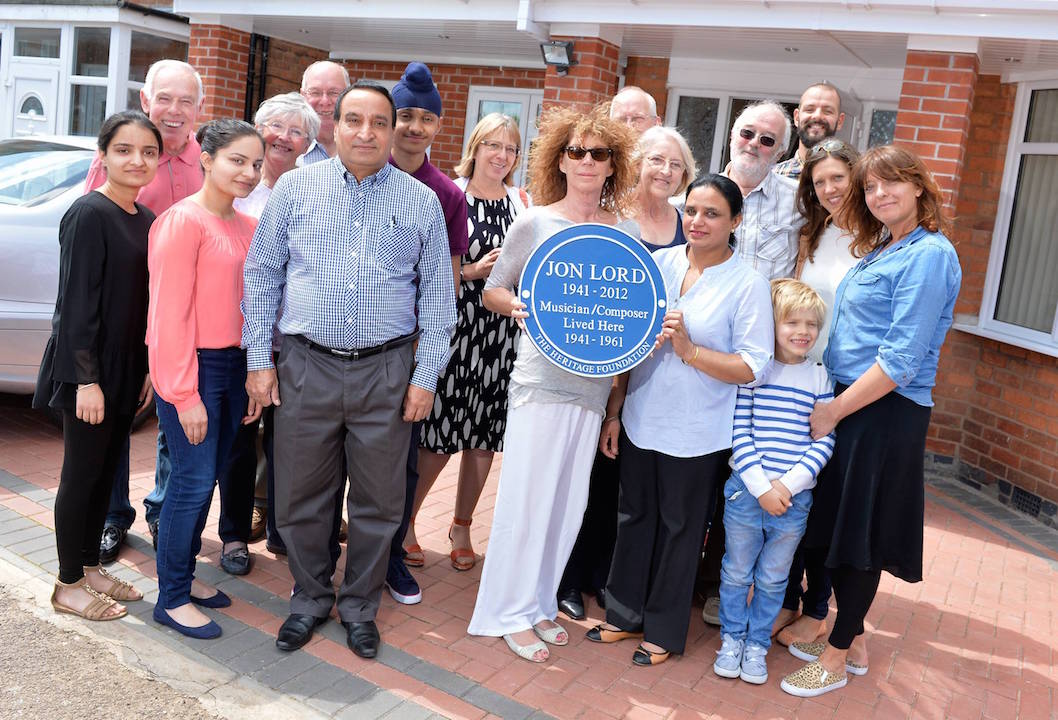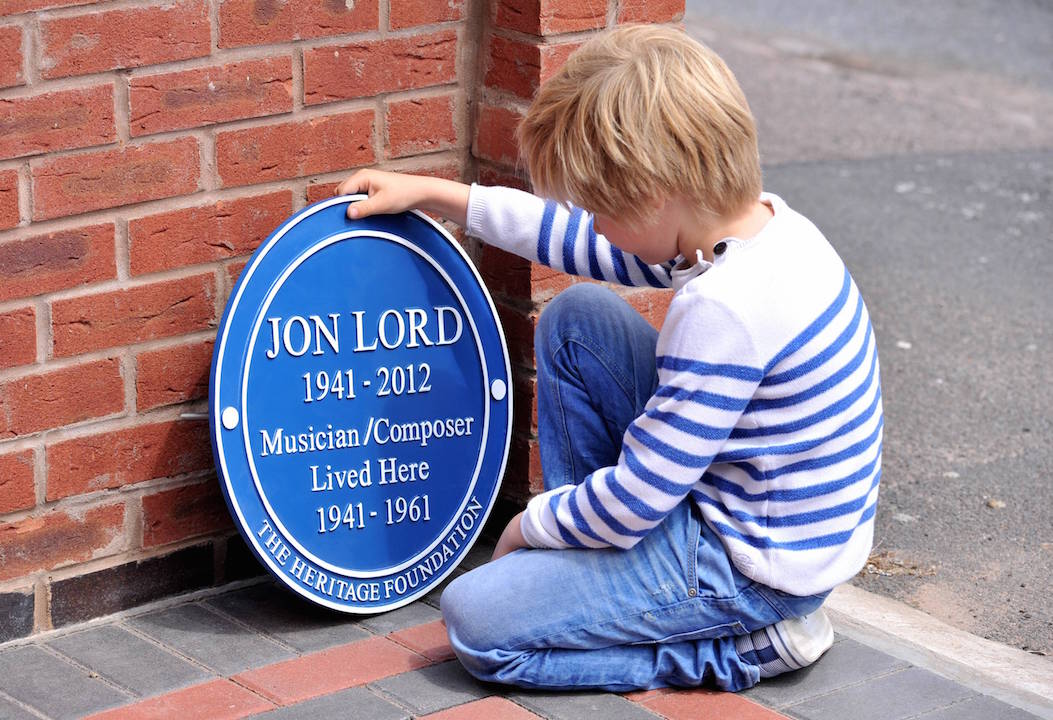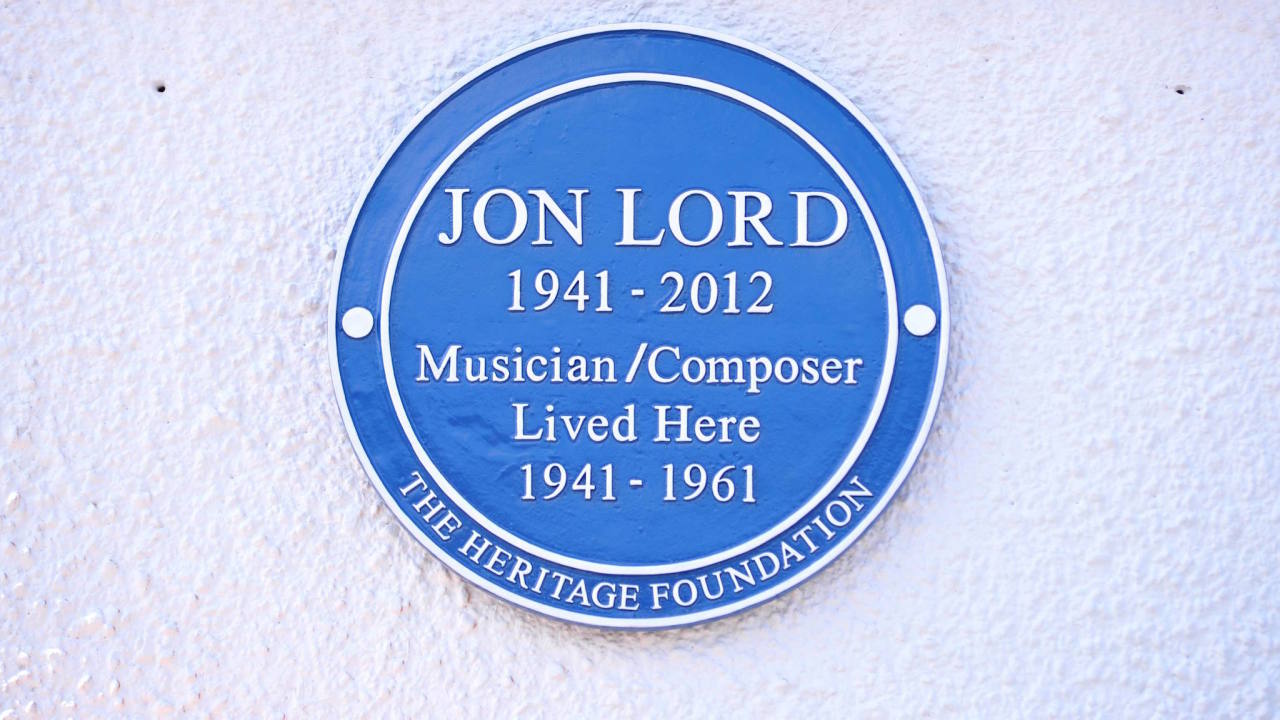On a day heavy with emotion, it was perhaps Jon Lord’s wife, Vicky, who summed it up best. “He’d have enjoyed this, you know,” she said, looking up at the blue plaque, moist eyes shielded by sunglasses. “He’d have said that he didn’t want the fuss, that he didn’t want anyone to go to any trouble - but secretly, I know he would have liked this. He would have been very proud.”
Standing in the street, looking up at 120 Averil Road, Leicester, a small congregation of family, friends and old mates had gathered to pay tribute to a special man: Jon Lord. Born on June 9, 1941 (today would have been the great man’s 74th birthday) this is where he was raised. It’s where he played with younger brother Steve, catching sticklebacks in the brook which ran by the bottom of their house, where he played football and cricket with his pals, and learned to play the piano.
He left, aged 20, determined to be an actor, but it was his talent as a musician and composer which would make him a global household name, first as a keyboard player in Deep Purple, Whitesnake, Purple again and then, latterly, on his own.
But Lord wasn’t just a consummate musician, the first man to successfully marry rock and classical music - ‘the maestro’, as David Coverdale referred to him on stage every night. He was a genuinely rare thing in a business full of brigands and egotists. He was a humble, decent man, too.
On Sunday, the city that shaped him in so many ways, a city which gave him a love of classical, jazz; where he saw Buddy Holly at the De Montfort Hall in 1958, a gig, he said which “changed everything”, paid tribute to one of its most famous sons.
The blue plaque, provided by the Heritage Foundation, was fitted to the front of the house. Family, friends, olds school mates and the current owners stood black and applauded.

Sara Lord, his eldest daughter, said her father would have been quietly chuffed to be remembered in such a way. “He was fiercely proud of where he was from - more so, I think, the older he got - and he always spoke warmly of Leicester, and growing up there,” she said. “I came here a lot as a child, to see my grandparents, Reg and Miriam, so I have a lot of good memories of this house and playing in Humberstone Park. It’s lovely to be back and to see this.”
Old school mate Jack Wootton, 73, grew up with Jon. They were near neighbours on Averil Road. “Jon was just a lovely lad. I remember calling for him one evening, we were playing cricket down the field, and he said: ‘I can’t come, Jack - I’ve got piano lessons.’
“‘Aw, don’t bother with that rubbish,’ I remember saying. ‘Come and play cricket with us.’
“Ha, ha. Just shows you how much I know, doesn’t it?
“I saw him one day in the late 1970s, I think. I was under my car in Averil Road. I felt someone give me a kick and I looked up and it was this chap with long hair and a big moustache. I didn’t recognise him, at first. But although his image had changed, he was just the same.”
Jon Lord died of complications arising from a year-long fight against pancreatic cancer in the summer of 2012. A year earlier, he had been given an honorary degree in music by the University of Leicester. With a lump in his throat, he told the audience that day at the De Montfort Hall — a venue he played many times with both Purple and Whitesnake — that the city of Leicester was rooted deep in his bones.
He had pains in his stomach that day. Doctors had told him he was fine. A few weeks later, a specialist broke the news. He was diagnosed with pancreatic cancer. It is, arguably, the worst cancer of them all; difficult to detect, with diabolically low survival rates.
But Lord had been responding well to pioneering treatment, both here and in Israel. Specialists had been injecting his tumour with live bird flu virus, which had kept the cancer in check. He was positive, too.
“It might not cure me, but I can live with it,” he said, in his last interview with Classic Rock. “I’m feeling well and I’m optimistic.”
A week after that interview, on July 16, 2012, Lord died of a pulmonary embolism. He was 71. He left a wife, two daughters, a legacy of brilliant music and a reputation, to all those lucky enough to have met him, played with him and interviewed him, as one of the nicest men in rock.
His brother, Steve, remembered him and his older brother growing up in a house that was full of music. Dad, Reg, a factory worker, sent them both for piano lessons.
“But,” he laughed, “I have to say it only really worked with Jon. Jon just ‘got’ it. He was a natural.
“I’m delighted to see the plaque though. I’m very proud that he is being recognised in his home city.”

Jon was a pupil at Humberstone Junior School and Wyggeston Boys School, where he passed five O’ Levels and two A’ levels. He had piano lessons every week from a tortured but brilliant classical pianist in Leicester. “I’d get a bus into town and walk across Victoria Park to his house,” Lord remembered. “My tutor was a troubled man but a musical genius. He pushed me constantly and made me the player I am, there’s no doubt about it.”
After leaving school and working, briefly, as a carpet fitter, he secured a grant from Leicester City Council to attend drama school in London. He studied the art of acting with a young Julie Christie.
His aim was to be an actor, but his musical dexterity meant he was regularly in demand as a session musician. He played on many records - including The Kinks You Really Got Me — before meeting Ritchie Blackmore and forming Deep Purple in 1968. Purple, of course, became one of the biggest rock bands of the 70s. When they split up in 1976, Lord - after refusing several times - became a member of Whitesnake, before rejoining Purple for a lucrative reformation in 1984. He retired gracefully from Purple in 2002, enamoured by the music, still, less so by the constant travelling and punishing schedules.
120 Averil Road now belongs to the Dhillon family. They bought the house in 2009. Daughter Simran Dhillon, 21, had no idea about the house’s history. “We only found out, I think, when Jon Lord died and the local paper got in touch,” she says. “We searched for Jon Lord on the internet and we could see what a good musician he was and how well-known and well-loved he was, too.
“We like the plaque on the house. It feels special. We feel very proud to live here.”
